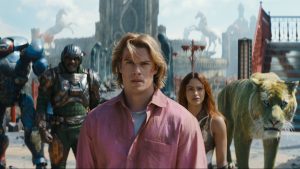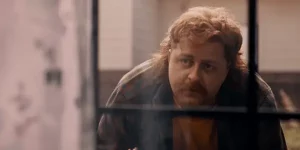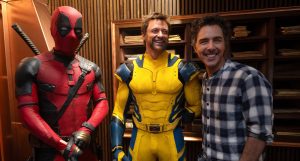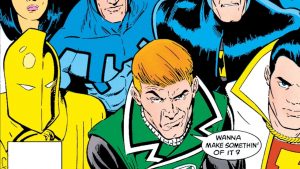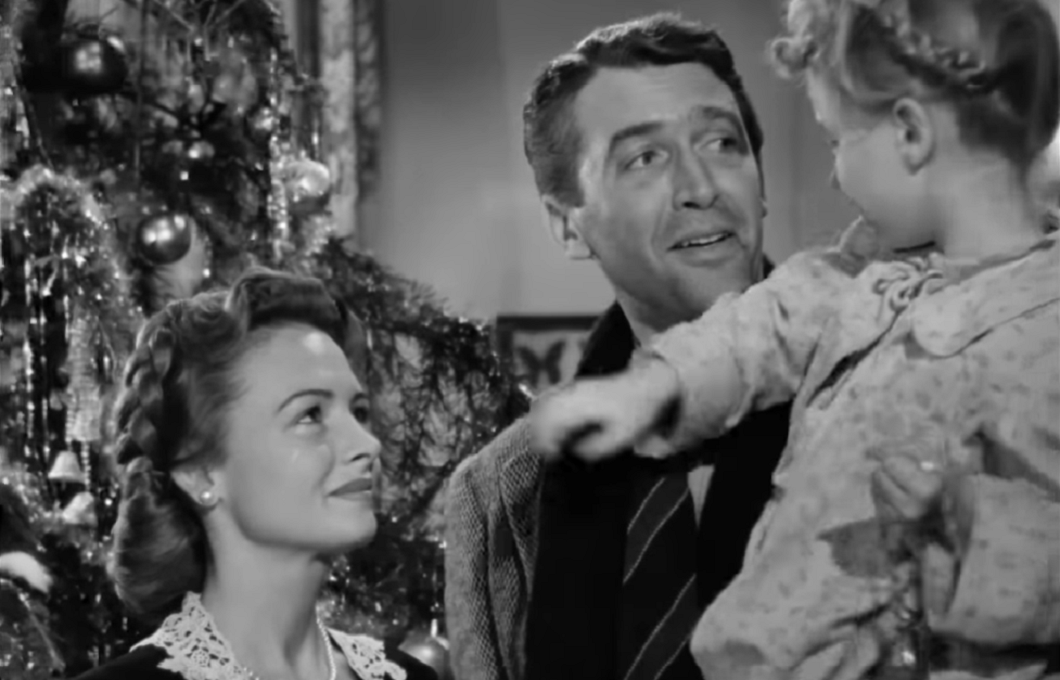
“I’m stuck here in this mudhole for life, doing the same full work day after day,” George tells a stranger he meets while leaning over a bridge. George has come to the bridge on a frigid winter night with the intention of throwing himself off and ending it all. “Other men are leading exciting lives, but I – well, I’m just a small-town bank clerk,” he vents. “I never did anything really useful or interesting, and it looks as if I never will. I might just as well be dead. Sometimes I wish I were. In fact, I wish I’d never been born!”
You probably know the above exchange as a scene from It’s a Wonderful Life, the 1946 classic starring Jimmy Stewart as George Bailey and Henry Travers as the lovable, doddering angel second-class Clarence Odbody. But the above quotation actually comes from the short story “The Greatest Gift,” written by Philip Van Doren Stern.
Stern’s story, originally published as a Christmas card the author sent to friends in 1943, contains the central idea of It’s A Wonderful Life. In it, the stranger grants George his wish and shows him what life would be like if he had never been born. At the end of “The Greatest Gift,” the stranger spells out his lesson for George. “You had the greatest gift of all conferred upon you—the gift of life, of being a part of this world and taking a part in it. Yet you denied that gift.”
While It’s a Wonderful Life does contain that moral, the screenplay by director Frank Capra and his co-writers Frances Goodrich and Albert Hackett adds another, more important theme, one brought about by a simple revision to the dialogue above.
Unlike George Pratt, the protagonist of “The Greatest Gift,” George Bailey is not just a small-town bank clerk. No, George Bailey operates the Bailey Brothers Building and Loan. That change of job reframes the stakes of George’s existence, making It’s a Wonderful Life all the more relevant today.
Nowhere is that more clear than in the scene in which George thinks he might actually leave Bedford Falls to go to college. After the death of his father, George forgoes his pre-college trip to Europe to help settle the family’s affairs. After he finishes the last bit of paperwork at a meeting of the bank’s board of directors, he pauses just long enough to hear the miserly Mr. Potter (Lionel Barrymore) announce plans to close the Bailey Building and Loan. With a cab waiting outside ready to take George away from Bedford Falls and to the cosmopolitan life he’s always wanted, George stops to make an impassioned plea.
“This town needs this measly one-horse institution if only to have some place where people can come without crawling to Potter,” he tells them, Stewart’s voice quivering with anger and desperation. The speech successfully prevents the board from shuttering the Building and Loan, but at a cost: George has to forgo his college plans to become executive secretary.
As this scene demonstrates, Capra and his co-writers reframe the central frustration of George’s life from simply an unfulfilled life to a life unfulfilled because of a man like Potter, a man who fears that homeownership creates “a lazy discontented rabble instead of a thrifty working class.”
Thanks to this change, George’s plight transforms from that of a big dreamer in a small town to one of economic reality. To be sure, Stren’s story does touch on economics, mainly when the stranger tells George to masquerade as a brush salesman to make his way through his old hometown, but that feels more like a plot contrivance than a thematic issue.
Conversely, Bedford Falls becomes the nightmarish den of iniquity “Pottersville” precisely because the Building & Loan died with Peter Bailey and Potter ran the city. Admittedly, the film throws in a few pearl-clutching elements that played better in the 1940s than they do today, like the rollicking jazz at Nick’s joint and the horror that Mary (Donna Reed) became an unmarried librarian, but the central issue comes from the way Potter squeezes everyone out for profit, a slumlord determined to keep everyone else down.
The conflict has played out time and time again across the world, both before and after World War II. The ruling classes use capital to restrain the lower classes, turning them into workers whose labor goes to benefit the rich. Basic human needs, such as the “fundamental urge … deep in the race for a man to want his own roof and walls and fireplace,” as Peter Bailey (Samuel S. Hinds) puts it, become simply leverage that the ruling class can use against the lower classes.
Today, more and more workers live paycheck to paycheck, eking out an unstable living in the “gig economy,” while the extremely well-off use the riches they largely inherited to consolidate the world’s wealth. Homeownership remains an unrealized dream for not only Millennials, the youngest of whom will soon be entering their forties, but for Zoomers as well.
In light of this harsh economic reality, It’s a Wonderful Life becomes, at worst, a powerful fantasy and, at best, a clarion call against those who subscribe to Potter’s views. When Potter hears of a family behind on their mortgage and threatens to foreclose, despite the fact that he’ll put children on the street, he barks “They’re not my children.” When Potter talks about Peter Bailey’s principles, he dismisses them as “high ideals” and insists, “ideals without common sense can ruin this town,” if common sense means putting profit before humans.
As Uncle Billy (Thomas Mitchell) tells Potter, “Not every heel was in Germany and Japan” during World War II. Nor is every heel like Potter on the movie screen. However, the world is full of George Baileys; people who understand that a community hangs together by the way they support one another and care for one another. People who know that others aren’t simply “cattle” to be corralled but humans whose flourishing helps us all.
For someone who only pays attention to the final act of It’s a Wonderful Life, it’s easy to scoff at the message that Clarence leaves for George at the end: “Remember, no man is a failure who has friends.” But thanks to the revisions that Capra, Goodrich, and Hackett made to “The Greatest Gift,” that statement has real weight. It attests to the power of the community to make a better world against the misers who want money and property all to themselves.
The post How a Small Change from the Book Made It’s a Wonderful Life an Enduring Classic appeared first on Den of Geek.
